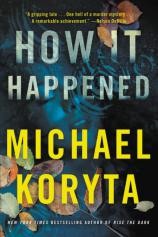How It Happened
Review
How It Happened
It is always nice to see Michael Koryta back again. His work defies easy categorization, straddling and mixing thriller, mystery and suspense genres with great aplomb and different background settings. Kortya does so once again with HOW IT HAPPENED, an atmospheric, slow-boil thriller that is part police procedural and part rural noir, and may be his best effort to date.
HOW IT HAPPENED does not begin so much with a murder as with the confession to a murder. Make that two murders, actually. The confessor is a woman named Kimberly Crepeaux, who is well known to law enforcement in the small town of Port Hope, Maine. She is a drug addict, prostitute, snitch, and general hot mess and train wreck all rolled into one troubled and troubling package. When Jackie Pelletier --- the adult daughter of Howard Pelletier, a local, well-liked fisherman --- goes missing with her significant other, Ian Kelly, the evidence left in the wake of their disappearance makes their murders a virtual certainty.
Kimberly, who had indicated complicity prior to her arrest on other charges, confesses many months later to being an accessory to their double murder under the persistent questioning of Rob Barrett, an FBI interrogation specialist. Barrett is very good at what he does, which is to separate truth from lies. He is convinced that Kimberly is telling the truth, in part because what she reveals regarding how it happened is consistent with the evidence law enforcement has.
"...an atmospheric, slow-boil thriller that is part police procedural and part rural noir, and may be [Koryta's] best effort to date... Koryta is at the top of his game in HOW IT HAPPENED. His style remains first rate."
There are two problems, though. First, as the investigation proceeds, further evidence is far and away at odds with Kimberly’s story. The second concerns her statements about Mathias Burke. A big fish in a little pond, Burke is well-liked and respected in Port Hope as an enterprising and hardworking young businessman. The picture that Kimberly paints of an angry, manipulative and drugged-out accomplice who was the primary instigator behind the deaths --- one negligent, the other intentional --- is totally at odds with Burke’s local image.
However, Barrett has remote ties to Port Hope, having spent grim summers there as a teenager and met Burke as a result. Kimberly’s depiction of Burke rings much truer to Barrett than the persona favorably regarded by Burke’s neighbors and peers. But when the evidence goes in a much different direction, indicating that she is lying about something (or maybe even everything), the FBI shuts down the investigation and reels Barrett back in, sending his career trajectory in the wrong direction.
Barrett, depressed and consigned to a dead-end but temporary assignment in Montana, broods about the investigation, but after returning to the Boston office finds himself drawn back into things. He feels that he owes a debt to Howard, who stubbornly held out hope that his daughter was still alive, but now, when confronted with proof of her death, wants justice to be done. Barrett also is unable to reconcile the evidence with what his own instincts and talents insist is the truth. When he can’t let things go, he places himself in danger as he becomes immersed in a plot that began far from Port Hope and may end with not only his own death but those of others.
Koryta is at the top of his game in HOW IT HAPPENED. His style remains first rate. There’s a description of a Port Hope ne’er-do-well about two-thirds of the way through the book that is only a paragraph long but makes the man in question jump and dance right off the page. That’s top-notch writing, and Koryta, as always, displays his considerable chops throughout the novel. Those who have not read his work recently should also find it quite satisfying in the straightforwardness of the plot and its memorable, small-town characterizations. If Koryta were to return to Port Hope at some point in the future, that would be a good and welcome thing.
Reviewed by Joe Hartlaub on May 17, 2018




